How far was German militarism the most important cause of war in 1914? Explain your answer. The assassination of Archduke Franz Ferdinand on the 28th June 1914 is seen as the spark which triggered the First World War. However, the fuse was clearly laid prior to this event and there are many complex causes that lie behind the outbreak of war. German militarism is just one of these, but is it the most important? Some people argue that German militarism was an important factor behind the outbreak of war in 1914 because it encouraged rivalry and tensions in Europe.
Led by Kaiser Wilhelm, Germany was clearly attempting to expand its empire in the early part of the twentieth century and therefore needed to combine that with building up their navy. This led to increased competition with Britain who already had a vast empire and also the best navy in the world. The Anglo-German naval race was so significant that the consequences of it led to both Germany and Britain forming alliances with other countries which some people would argue was a more significant cause of the war since it was these Alliances that brought so many more countries into it.
However, there is no doubt that the fear and tensions caused by German militarism did force countries to form stronger bonds with each other against common enemies. On the other hand, other historians would argue that German Militarism was not the most important cause of war in 1914 and instead it was the Imperialistic nature of countries that was a far more significant cause at the time because this produced many flashpoints which made war almost inevitable. The first of these can be clearly seen in the case of Morocco where two crises occurred in 1905 and 1911.
These were driven by imperialistic goals of France first and foremost but also the involvement of Germany in these affairs which clearly agitated the French and also worried Britain mainly because of the suspicion of Germany’s motives for getting involved. Germany’s aim to expand her empire and the Kaiser’s dream of “a place in the sun” led to her building up her navy so as to be able to build an empire and develop colonies overseas. Had it not been for this it is rguable whether Germany would have been militaristic at all and therefore it can be argued that imperialism is almost seen as the root cause of militarism and as such is a far more significant factor behind the outbreak of war. To conclude, it is important to see both German militarism and imperialism as not separate causes but causes that are completely intertwined with each other. When one considers that Germany invaded Belgium, a neutral country, there is no doubt level of aggression was shown that went well beyond aiding countries that you were allied to. This is why Germany’s activities prior to 1914 are so important to investigate.
Kaiser Wilhelm was an absolute monarch who made the sole decision to go to war. He was a man who had a vision of a Greater Germany and thus was extremely imperialistic and militaristic. Introducing conscription was clearly an act that demonstrated war was on the cards but the seeds were sown well before this by the jealousy and resentment the Kaiser had shown towards the empires of Britain and France. How far was German militarism the most important cause of war in 1914? It was an extremely important cause but only as important as the cause of German militarism and that was German imperialism.





